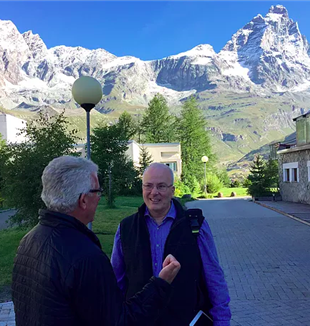
Reflection from the Foot of the Matterhorn
After my eleven-hour flight to Milan, followed by a 3-hour bus trip to far-northern Italy, I was overwhelmed by the beauty of the area chosen for the International Responsibles Assembly...After my eleven-hour flight to Milan, followed by a 3-hour bus trip to far-northern Italy, I was overwhelmed by the beauty of the area chosen for the International Responsibles Assembly. The Matterhorn towers over us, hidden in clouds, or emerging majestically on a clear alpine day (no, we weren’t at Disneyland Europe). The beauty of nature was a reflection of the beauty in the people there, all united by having been grasped by Christ through the genius of Msgr. Luigi Giussani.
The week began with an assembly, where several hundred leaders of CL communities from around the world shared their experiences, difficulties and testimonies from recent months. One thing that struck me was the ever-increasing brokenness in people and relationships. From the Latin America to Europe, from the U.S. to the Middle East, participants told stories that brought out the deep suffering and confusion touching each and every one of us, in our families, our friendships or our workplaces.
We modern people no longer accept anything as true in itself — our identities are unclear, our capacity to trust others has been vaporized. Fr. Carrón spoke of the “collapse of evidence,” something we see around us and experience in our own flesh. Even that most basic ideas that most people shared just a generation ago have become controversial propositions.
But within those very stories of collapse and brokenness, we heard witnesses of how a glimpse of a different, fuller, humanity had pierced the wall of prejudices, how it had triumphed over the urge to self-destruction. We heard how the beauty of Christ, experienced in a moment of human tenderness, gave hope to the hearts of people who had given up on happiness, or attracted the curiosity of those seeking something true for themselves or their loved ones.
We were reminded continually of the figure of Abraham, the Mesopotamian wanderer who, thanks to God’s initiative, was able to speak to the Mystery as “You” and thus became an “I” and the father of a people in history.
We saw how even in places like the war-torn Middle East, the attractiveness of Christ wins -- a defenseless, “unarmed” beauty, whose only weapon is it’s own attractiveness, which draws out my freedom, not with threats or cunning arguments, but with fascination.
As I said goodbye to the Matterhorn and prepared for the long flight home, I thought about Msgr. Giussani who, like Abraham, was faithful to God’s action in his life and turned what he saw into a method for facing the challenges of our postmodern world. I was thankful to Fr. Carrón for having the courage and serenity to help us learn what Giussani wanted to teach us.